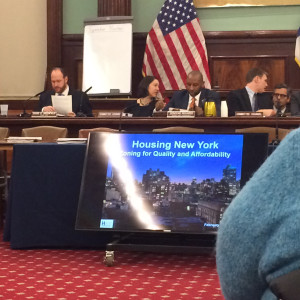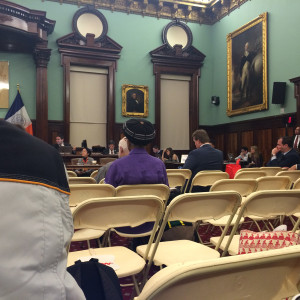 Beginning at 9:30 this morning, the City Council Committee on Zoning and Franchises began a hearing on the Department of City Planning and Department of Housing Preservation and Development’s proposal for ZQA, or more formally, Zoning for Quality and Affordability. This bookends the other parallel- but entirely separate text amendment proposal of MIH, or more formally Mandatory Inclusionary Housing which went on for hours on February 9th.
Beginning at 9:30 this morning, the City Council Committee on Zoning and Franchises began a hearing on the Department of City Planning and Department of Housing Preservation and Development’s proposal for ZQA, or more formally, Zoning for Quality and Affordability. This bookends the other parallel- but entirely separate text amendment proposal of MIH, or more formally Mandatory Inclusionary Housing which went on for hours on February 9th.
Chair of the Zoning and Franchises Committee, Council Member Donovan Richards opened the meeting and accepted the testimony for HPD Commissioner Vicki Been and DCP Chairman Carl Weisbrod. Chairman Wisebrod described the intent of ZQA as one to create and preserve over two hundred thousand units of affordable housing over ten years. In a markedly sharp turn over previous meetings the focus of much of the ZQA testimony from the city centered on providing for Seniors. As Chair Weisbrod commented on additional anti-displacement efforts, the City still held firm that the provisions of ZQA will not promote any “tear downs” that aren’t currently allowed by current zoning. Luckily some of the opposition was present to set the record straight.
Imagine for a moment, having a four-story building with several long-time residents. If you are zoned for 10 stories you are losing out on six stories of “return” but holding steadfast. Now imagine, that 10 could actually be 12 stories if you build new. Doing so allows you to clear your building, charge a greater percentage of market rate and also have affordable units- which still yield SOME return. Moreover, they allow you to have a larger building, command better views, and thus reap even greater rents- why not pursue this option?
As Chairs Been and Weisbrod continued, the Council Members and public heard all about the limits which impede the construction of nursing care, and nursing homes. While the DCP continually claimed that omitting three parking spaces from these developments would create two additional units of affordable housing. Council Members from Queens, the Bronx and the far (and near) reaches of Brooklyn challenged the definition of “transit zones” and the reality of wheel-chair bound seniors using a mass transit system which lacks accessibility, or even anyone else finding space on an L train out of Williamsburg. Brooklyn Council Member Mark Treyger called the city out asking if the city had the infrastructure for the incoming seniors- needs such as hospital bed counts. He recounted the loss of the F express train, the ever-limited bus services and cautioned against building high density in areas that are in mandatory evacuation zones where his constituents who live in the existing conditions of density were trapped during the aftermath of Super Storm Sandy.
Whenever the issues got specific, the Commissioners offered side bar meetings to discuss the issues to assuage fears. The refrain of Vicki Been was “don’t let the perfect be the enemy of the good”, yet many valid points were rearing their heads as the enemy. Community Board 7’s council member, Helen Rosenthal was the first to even mention the mal effects of the Sliver Law, a law which Carl Weisbrod helped write a generation ago! Chair Weisbrod justified skirting the Sliver Law ONLY in the interest of Affordable Housing and for Senior Housing purposes. East Side Council Member Ben Kallos also expanded the discussion, picking up on the Sliver Law concerns, but also pushed for clarity on why both Chairs publicly cite five and te n foot increases yet R9A and R10A districts are still slated for much more density! In a jam-packed three minutes at the switch, Kallos also called out ZQA for expanded protections of shadows over the park – requesting not just a 100′ perimeter but a 1,000-foot buffer. He listed other concerns with current zoning such as excessive lot mergers and FAR hoarding and demanded that the Senior Housing be permanent- an issue that Chair Been insists she will not do without identified funding.
n foot increases yet R9A and R10A districts are still slated for much more density! In a jam-packed three minutes at the switch, Kallos also called out ZQA for expanded protections of shadows over the park – requesting not just a 100′ perimeter but a 1,000-foot buffer. He listed other concerns with current zoning such as excessive lot mergers and FAR hoarding and demanded that the Senior Housing be permanent- an issue that Chair Been insists she will not do without identified funding.
The testimony continues. LANDMARK WEST! testified a little after 1pm before the remaining present Council Members- Chair Donov
an Richards, along with Margaret Chin, David Greenfield, and Vincent Gentile. A copy of our statement follows this post. When asked if we could change one thing in ZQA what would it be? We answered that there were a number of tweaks that could be made but ultimately this proposal assures not one single unit of affordable or senior housing will EVER be built. It is inherently flawed and serves no public benefit.
Catch up on the MIH and ZQA discussions HERE . ALSO, READ on for LANDMARK WEST! TESTIMONY, and share your comments below:
Testimony of LANDMARK WEST!
Before the New York City Council
Subcommittee on Zoning and Franchises
Re: Zoning for Quality and Affordability / Mandatory Inclusionary Housing
February 10, 2016
LANDMARK WEST! is an award-winning non-profit working since 1985 to achieve landmark status for individual buildings and historic districts on the Upper West Side and to protect them from insensitive change and demolition.
LW! supports the goal of affordable housing for all New Yorkers. But it’s time to call out the fact that the Emperor has no clothes. Mayor de Blasio’s affordable housing “plan” is no plan at all. It is a smokescreen for developer giveaways. Please do not allow yourselves to become enablers of such dangerous public policy.
If we believed that the so-called “Zoning for Quality and Affordability” (ZQA) and “Mandatory Inclusionary Housing” (MIH) proposals would result in meaningful progress towards providing housing opportunities for those who need it most, we would make every effort to advance changes to mitigate the very real, very destructive impacts these proposals would have on our city’s neighborhoods. Those impacts include out-of-scale development overshadowing traditional human-scale blocks, driving out small businesses, and overturning long-established, hard-won, proven effective zoning tenets such as the Sliver Law, contextual zoning tailored to specific communities, and preserving light and air on midblocks and in rear yards.
The sad reality is that ZQA and MIH will not deliver on real affordability. Believing that they will is, at best, wishful thinking; at worst, it is buying into a developer’s vision of New York in which nothing matters but the bottom line. Consider both the substance and process of these proposals. ZQA and MIH were introduced simultaneously, as though they were somehow interdependent, when in fact they are wholly separate ideas. ZQA, which does nothing more than enable developers to exploit every square foot of allowable floor area on a site—to maximize profit—turned “Progressive” by association with MIH. Yet, while MIH contains gaping developer “hardship” and other loopholes that undermine its “inclusionary” premise, ZQA does not guarantee a single unit of permanent affordable housing. Where is the public benefit that would justify such sweeping changes to our city’s zoning?
That is the key question for any government regulation. But the idea of legitimate public purpose has been totally railroaded by this rushed, opaque, un-kosher process. Bear in mind that we are not in ULURP, only in a ULURP-like process. Both proposals have been in an almost constant state of flux since they were introduced. They have been subjected to a fast-and-loose “environmental review” that fails to consider how specific neighborhoods would be impacted. LW! worked with recognized zoning experts from the firm BFJ Planning, who stated, “A single project would be subjected to more far-ranging public review than what has been billed by the Administration as the most ambitious plan in the nation.”
Zoning is but one planning tool intended to manage development and protect the public interest. ZQA and MIH reinforce the dangerous idea that so-called “development rights” created by zoning trump all other public rights—for example, a child’s right to walk down a street that is not plunged in shadows or to be educated in a classroom that is not overcrowded as the result of heedless densification. This is the collateral damage of zoning without planning. This is what happens when we put our city up for sale.
Edward R. Murrow said, “A nation of sheep will beget a government of wolves.” We are not sheep, and neither should you be. Please do the right thing and disapprove these proposals.
